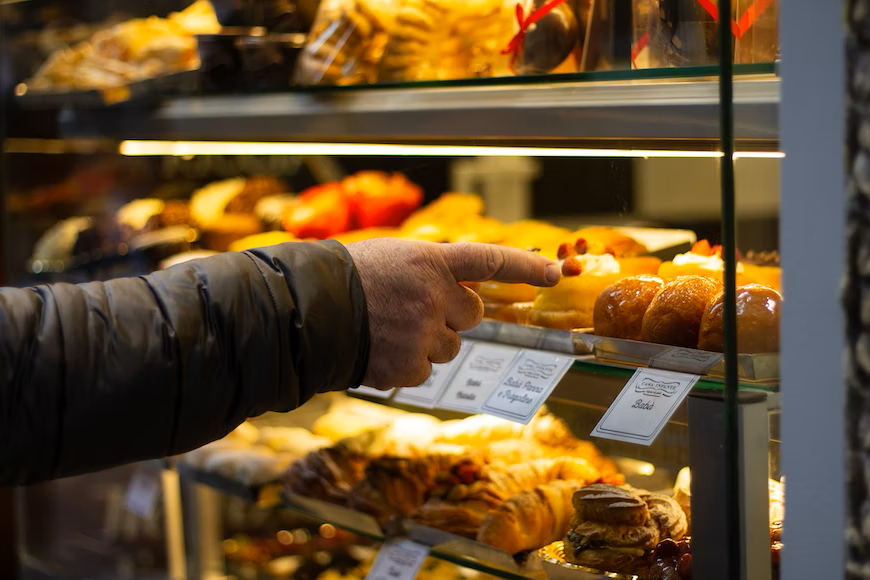
Stop labelling food!
I hear a lot of conversations from colleagues about whether they’ve been “good”, “bad” or “a little bit naughty”. Despite trying to be good, it seems being “bad” is inevitable! I’m baffled about how to get involved in these conversations, I’m not entirely sure what “good”, “bad” or “naughty” means. Through my eating disorder recovery, I’ve learnt that food is essential for life so how can it be bad to eat?!
I hear things like “well you’ve got to haven’t you?!” referring to “being a bit naughty”. It seems that if you want to have a good time, enjoy the social experience etc, “bad” food is usually consumed.
As regular readers of my blog will be aware, the angle I’m coming at this is having had an eating disorder. In my anorexic world, fewer and fewer foods made the “acceptable” list as more foods were transferred to the “dangerous” “scary” or “never eat” list. I could sometimes move a food from one to the other depending on how I ate it, whether I’d starved myself for long enough or if I knew I was going to be able to get enough exercise in. When things got really bad, there were certain food that made a list I’m ashamed of, that is “easy to purge”.
I’ve written previously about disordered eating and how dangerous that is; I think labelling foods is unhelpful and is down the road to disordered eating, unfortunately, it’s incredibly common.
Even considering some foods as “more healthy” than others is unhelpful. There are diets that are more or less healthy but no individual food is inherently unhealthy. Yes, we all know we’re meant to eat more fruit and veg in your diet than cakes, chocolate and biscuits but it is perfectly healthy to have some chocolate, once in a while (or everyday if that works for you).
One study may show that brown or “whole” foods are “more healthy” than their white counterpart, indigestible fibre helps keep he gut healthy; however, there are numerous bowel conditions that are exacerbated by high residue foods which means “white” foods are more healthy for these people.
One study shows particular foods as able to prevent cancer or some other illness, the next week, the same food will be shown to cause the aforementioned illness. The only conclusion to take from these is there is a no special diet that will cause or prevent any illness.

What’s also unhelpful is people believing their diet is “better” than someone else’s. Who’s to say why someone eats the way they do? Some people need to eat calorie dense foods quickly because that’s what suits their lifestyle. Other people need to eat food that will metabolise more slowly. We all have different body makeups and it’s wrong for anyone to impose their idea of “health” on anyone else. Being vegetarian or vegan is a personal choice that should not be imposed on anyone else (if you want to campaign against the meat/dairy industry that’s fine but don’t attack or reproach individuals).
In our diet culture, when people try to lose weight (to get their BMI to within the healthy range), they (usually) have a list of acceptable foods and unacceptable foods; however, it has been proven that deny yourself foods makes you crave them more (restricting in generally makes you more likely to binge) and feeling guilty about eating just adds to the negative effects! Foods high in saturated fat, high in sugar sugar or foods subjected to a lot of processing may have a negative impact on our health but if you like it, don’t feel guilty about eating it!
Food has also become a way of people feeling morally superior, if you choose “organic”, “free range”, “ethically sourced” or “sustainable”, some people consider themselves a better person than someone who doesn’t or can’t choose those options, for whatever reason. I’m vegetarian for a variety of reasons, I do not consider myself as morally superior, it’s my choice, I do not push my values on anyone else, please don’t push your values onto me.
Don’t get me started on “clean” eating! It’s such a bizarre label, if you want to choose certain foods because they make you feel good, go for it, but as far as I’m concerned if I’ve washed it, it’s clean! Don’t label everyone else’s diets as dirty just because you want to restrict your diet and feel ok about it! This label can be the start of a dangerous spiral into orthorexia.
Virginia Wolfe once said:
“One cannot think well, love well, sleep well unless one has dined well.”
Having previously categorised foods a “ok”, “scary”, “bad” or “unbearable”, I’m glad those days are behind me. I now see food and decide if I want it based on whether I want it or not – if I’m hungry, I’ll eat foods that will satisfy my hunger. If I’m not hungry but food is available/offered, I make the decision based on whether I like the taste, whether I’ll enjoy eating it and if it’s going to appropriate within the context of other things I’ve eaten. If you’re not hungry it’s not “right” or “wrong” to eat food it just requires thought.
If we label the foods as “good”, “bad”, “naughty”, “healthy”, “unhealthy”, “better” or “worse”, by extension, we label ourselves, this can have a profound impact on our self esteem. Feeling guilty or shameful about eating is not ok, making other people feel guilty about eating because of the choices you want to make is not ok. Let’s just eat the food we want to eat and stop labelling ourselves as “good”, “bad” or “naughty”.




